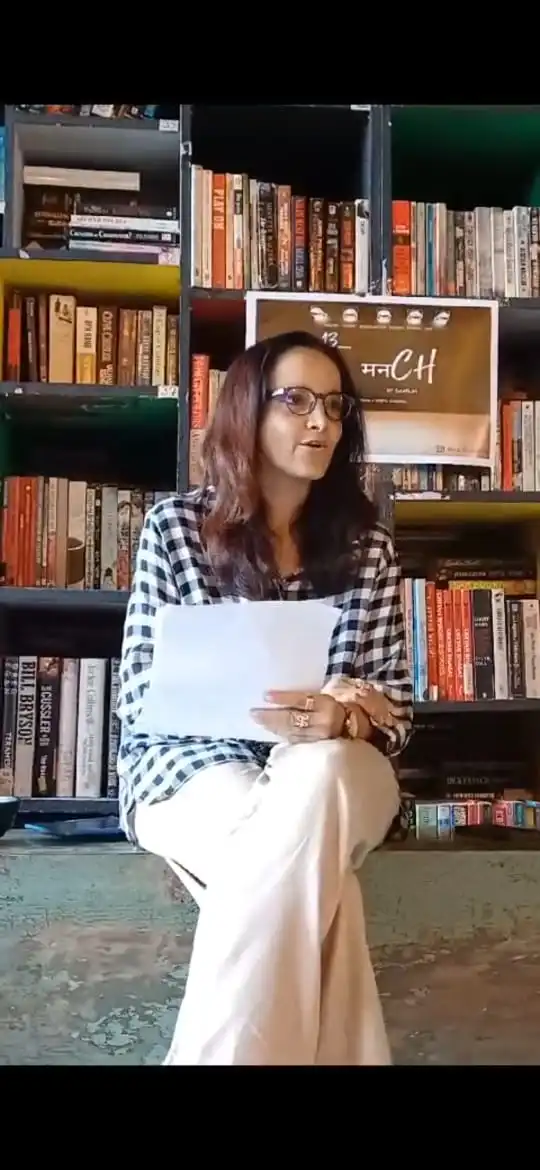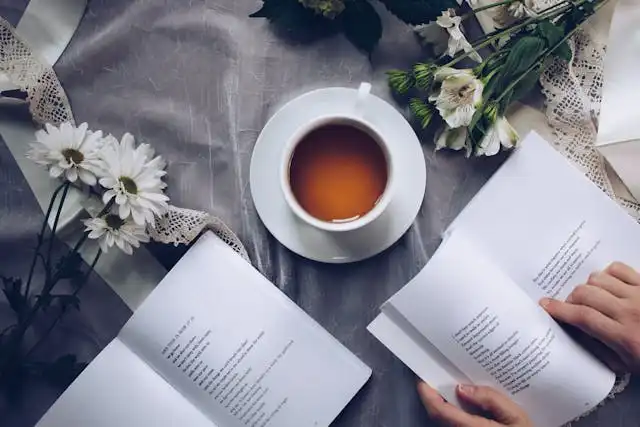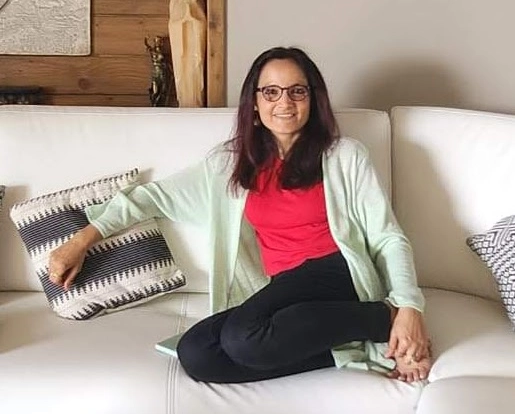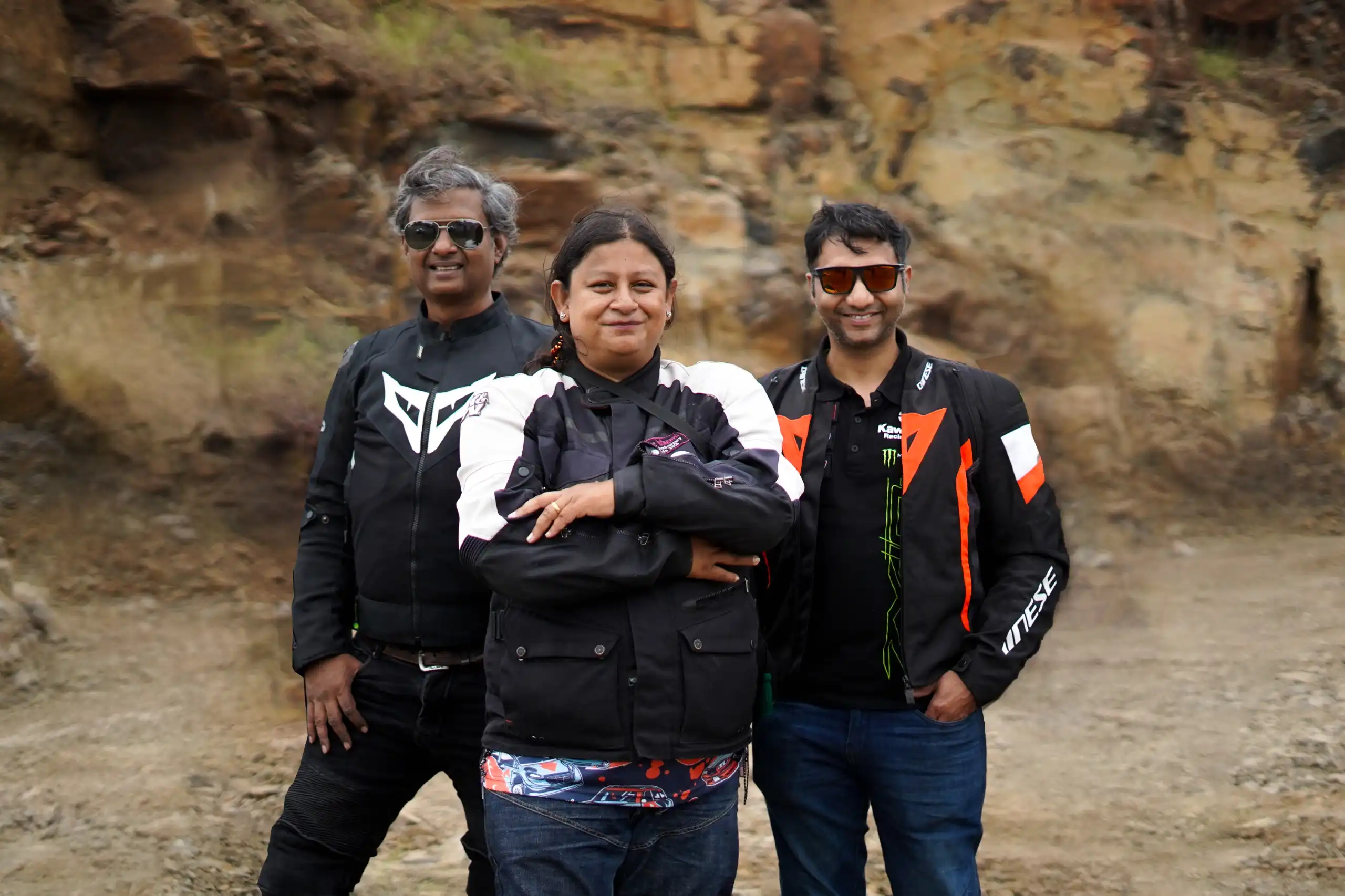Garima Mishra, a former journalist with The Indian Express and a seasoned poet, has dedicated herself to creating कविताKAFE—a new platform for poetry lovers. Driven by her desire for a deeper connection in the poetry community, Garima aims to create a space for poets to not only perform but also engage in meaningful discussions about their craft. Through workshops, open mics, and collaborations, कविताKAFE opens the door for emerging poets to explore, learn, and grow together.
Excerpts from the interview:
What inspired you to start कविताKAFE?
As a poet, I have performed at a few open mic events over the past few years. These platforms undoubtedly offer a positive experience for sharing your work with other authors and listening to other works. After your performance, though, the experience comes to a conclusion with a few people applauding and complimenting you. There’s no creative dialogue between writers. As a writer, I would like to talk to the poet when a piece of poetry resonates with me in order to learn more about their inspiration, viewpoint, word choice, etc. We might gain from sincere, in-depth criticism and critical evaluation of one another’s work just as much as a poet would from applause and “waah waah” after a performance.
I therefore wrestled for about a year with the idea of forming a poetry group that provided more than just spoken word performances. Thus, कविताKAFE came into being.
During your journalism career, were there moments that inspired your poetry?
I had started writing poetry slightly before I started working as a journalist. Yes, there were moments and incidences that touched me deeply during my journalism days. Not all translated into poetry due to shortage of time, journalism being a demanding profession. Also, I feel our perspective of life keeps evolving with time. I am more in touch with my emotions today vis-à-vis my journalism days. According to me poetry is around us all the time, even in the little mundane and inconsequential moments. It’s only when we begin to take a pause and look deeper, we are able to translate these moments into something more meaningful. I am glad that alongside my current professional commitments and responsibilities, I am able to do things I am passionate about.
What did you learn from running a poetry workshop for kids, and how do you think poetry can impact youth?
In collaboration with Lampshade Writers and the Bansa Library, I led a workshop on Hindi poetry writing in June 2024. The program was intended for the children of the Bansa Library, located in the Uttar Pradesh village of Bansa in the Hardoi district. I learnt a lot from it about the craft of teaching poetry writing as well as poetry as an art form. I made sessions participatory rather than dry monologues because children have shorter attention spans. Included instances of real-world scenarios, well-known stories and poetry, pictures, etc. to spark attention. Even though the workshop’s subject—“poetry writing”—was unfamiliar to the children, they demonstrated remarkable adaptability. Unlike grownups like us, they were able to quickly transition between ideas and tasks. Even though their poetry were straightforward, they demonstrated their unadulterated creativity and talent. I discovered that young brains can think and assess poetry in different ways since they are not constrained by predetermined norms.

How does your daughter feel about your poetry?
Although my daughter Rashi herself is not so much into reading and writing poetry herself, she does enjoy listening to my poems attentively every time I narrate it to her. She also asks questions when she’s unable to understand some line or some word. Sometimes she also shares my poetry in audio format with her friends.
With events like open mics and book launches, what are you most excited about for कविताKAFE’s first event?
The inaugural event of कविताKAFE will feature spoken word performances. I am excited to meet and see poets perform, both those I have heard before and those I will be seeing perform live for the first time. This will set the ball rolling. I aim to explore innovative formats and collaborations in the future sessions.
What’s your vision for कविताKAFE’s growth?
In addition to open mic events, we would also offer workshops & masterclasses in poetry writing, discussions, poetry contests, curated poetry events, mentorships, online forums, poetry book launches, etc. कविताKAFE would also offer interdisciplinary fusion wherein poetry would be integrated with music, art, dance, or theatre. No matter what we do, poetry will always be at the core of कविताKAFE.
Will कविताKAFE focus on certain themes in poetry, or are you open to a wide range?
Creativity is all about expanding horizons, so कविताKAFE as a platform would be exploring different themes from time to time. In addition to common and contemporary themes, कविताKAFE would also touch upon themes like as social justice, environmental reflections, cultural heritage, mental health awareness, etc.
How is sharing your poetry in audio formats, like LafzByGarima, different from traditional written forms?
The habit of reading is evolving. Unlike in the past, people are too impatient to sit and read. There’s a rise in the trend of audiobooks, e-books, book clubs, literary communities, etc. The trend of podcasts has picked up over the past few years and I feel it’s here to stay for a long time. It’s a powerful tool for content consumption for all age groups. Keeping this in mind, I launched my own poetry show LafzByGarima. The advantage of the audio format is that it allows me to convey emotions through tone, pitch and voice modulation. Taking pauses at the right place and emphasising a few words can uplift a poem. In addition, it allows me to add background music which makes it enjoyable for the audience. Overall, poetry becomes an immersive and engaging experience for the listeners.
As a child, I recall my mother playing the bhajans of Mirabai, Tulsidas, and Kabir on the cassette recorder when I woke up. It had an impact on the unadulterated terrain of mental development, but I was too young to fully comprehend what it meant
How do you approach writing in Hindi versus English? Are there unique challenges or rewards in each language?
I never decide the language of my poetry beforehand; the poetry itself chooses it. So, if the first thought or line of the poetry that comes to my mind is in English, I end up writing the entire poem in English, and vice-versa. I hail from Northern India and Hindi has been my first language. However, my professional life revolves around English. I am a lot into reading books and 99% of what I read is in English. On the other hand, when it comes to podcasts, I listen to both English and Hindi. I’ve thus experienced the best of both worlds. Having said that, I do have a soft corner for Hindi language mainly because of its tonal quality and phonetic resonance. It helps me convey subtle emotional shades. For me, the effect of the sounds and rhythms in Hindi evokes deep emotions. Hindi language is deeply rooted in Indian culture and allows us to tap into shared experiences.
Which poets or writers inspire you, and how have they influenced your poetry style?
My initial introduction to poetry was subtle and unintentional. As a child, I recall my mother playing the bhajans of Mirabai, Tulsidas, and Kabir on the cassette recorder when I woke up. It had an impact on the unadulterated terrain of mental development, but I was too young to fully comprehend what it meant. Years later, of course, I realised the deeper implications of those bhajans. I must have been in my early 20s when I stumbled upon the novel ‘Godan’ by Munshi Premchand. I got bowled by his simple style of writing and the way he captured rural life and social problems. Later, I read a few more books by him. The writings of Amrita Pritam also moved me. Amongst the contemporary writers and poets, I admire Gulzar and Javed Akhtar.
What does poetry mean to you, and why has it remained such an important part of your life?
As an individual, I am more of an introvert. I steer clear of surface level conversations and relationships. When there’s no possibility of deep conversations, I enjoy solitude and harness it for reflection and inspiration. Writing as a medium and thereby poetry helps me channelize my emotions in a better way. I feel poetry is no different than journaling. You are pouring out and venting out in both. Both focus on self-expression and thus are cathartic. While journaling is private, poetry, which has aesthetic appeal, is intended for audience and public. I am able to convey complex emotions easily in a poetry. In that sense, I have an intimate relationship with words. So, poetry is a tool of expression that aligns with the person that I am.

Could you share more about your project Mujh Jaisi? What was it like to work with artists across six languages?
What makes Mujh Jaisi special is that it’s written by a woman, it’s about women, and is translated and narrated by women. All the six women with whom I have collaborated are special in their own ways. The poem is based on the theme that through the universal sisterhood runs a tacit thread of similar dreams and nightmares, a toss of confidence and diffidence, a throw of challenges and opportunities. The collaborating artists have not only translated Mujh Jaisi but have also recited the poem for the podcast. Mujh Jaisi is available on the poetry podcast titled LafzByGarima on various platforms such as Spotify, GooglePodcast, ApplePodcast, RadioPublic.com, Chartoo.in, Pocket Casts, etc.
Collaborators include:
1. Dr. Bobby Sarma Baruah, who has done Mujh Jaisi’s Assamese version titled ‘Mur Nisina’, is an Assam-based National award-winning Assamese filmmaker, film researcher, producer, and screenwriter whose award-winning movies include Adomya, Sonar Baran Pakhi, and Mishing.
2. Pune-based Dhanashree Heblikar, the co-founder of Swatantra Theatre and a theatre and film actor, has done Mujh Jaisi in Marathi. She received the Best Actress Award for the year 2018 from the Maharashtra Government.
3. The Punjabi version ‘Mere Vargi’ is done by Sunanda Mehta, journalist and the author of the biography ‘Extraordinary Life of Sunanda Pushkar’.
4. .France-based Krys, who works in the medical field and teaches therapeutic yoga, in addition to being a French literature enthusiast, has translated and narrated Mujh Jaisi in French titled Est-ce Moi?
5. Renuka Vijairaghavan, who runs the Literature Club in Pune and is also a sustainable lifestyle coach has done the English version.
6. Kerala-based Renitha Nalini Ravindran, who is a director at Be Worldwide, has done Mujh Jaisi in Malayalam and indulges in writing Malayalam poetry.





